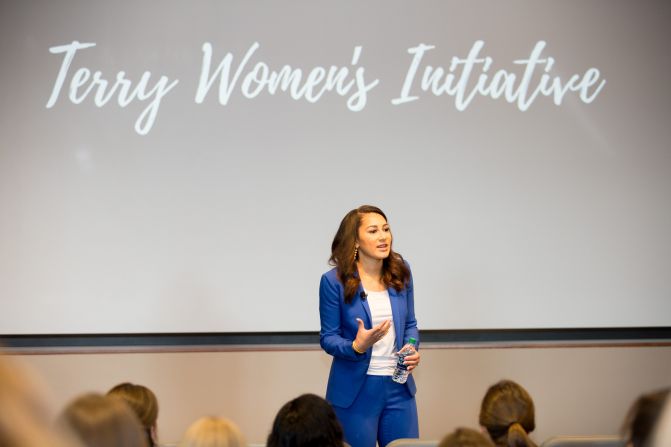When women control their own stories, they control their lives. That was the message Morgan Radford, a 30-year-old correspondent for NBC News, delivered during her keynote address at the Terry Women’s Initiative Student Conference on April 6.
“For women, our narratives are critical in defining our professional profiles,” she said. “They become our truth.”
Radford shared her story of growing up in Greensboro, N.C., landing an internship at CNN, then facing rejection from Columbia University’s graduate school and every journalism job she applied to.
Those denials led her to apply for a scholarship to work with children in South Africa, where she helped produce testimonial videos. One video, in which a girl named Pearl opened up about the abuse she suffered, stirred a change in Radford. When she returned to the U.S., she reapplied to Columbia.
“I looked up the application, and it was due the next day. So I barricaded myself in my room and I started writing. I wrote about Pearl. I told them, ‘You rejected me the first time, but I met this girl in South Africa and her story deserves to be told. And you can come along for the ride, because I’m going to tell it.’ I told them that no one who had ever bet on me has lost,” she said. “They accepted me and gave me a full ride.”
After graduation, Radford was hired by Al Jazeera America. Not long afterward, she became NBC News’s youngest correspondent.
And though her career arc may sound impressive and enviable, it only came about through lots of rejection and dismissals, she said.
“That’s why our stories are important. They take us away from our highlight reel. They show us the valleys before the peak,” she said. “They show us how to be vulnerable. When we lean into that vulnerability, that’s what allows people to connect with us. Even though you take a huge risk by being vulnerable, the potential for connection is huge.”
Radford offered her audience a cheat sheet for crafting their stories — something she recommended for cover letters, applications for graduate school and job interviews.
“Your story must contain the three C’s: crisis, choice and conclusion,” she said. “It’s the tension between a crisis and hope that’s interesting. You want to capture that.”
Good stories begin with a crisis the story’s subject faces, examine the choice the subject makes, then identify the outcome of that choice, Radford said.
“When you’re talking about your crisis, explain how it made you feel. Why is that crisis yours? Then, tell them what choice you made or didn’t make. Did you feel pressure? What were the mechanisms that went into making that choice?” she said. “Finally, what was the outcome? Were the repercussions what you thought? Who were you on the other side of that decision?”
Stories that move along those lines will be personal and unique. That means, for many members of the audience, their story may not match up with the examples commonly seen in the media, Radford said.
“Personally, I think that feminine power is one of the most powerful forces in the universe,” Radford said. “You can be exactly who you are and still win.”

